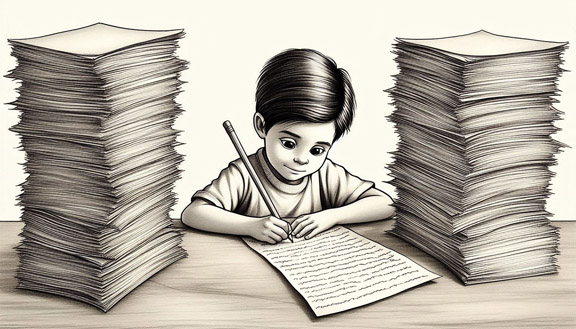
My Third Autistic Memory
I’m autistic, so all of my memories are autistic memories. But in this case I’m talking about times when my behavior showed an especially high number or intensity of behaviors associated with autism. Enough that, looking back on it today, I have to ask how nobody noticed. I’m starting with memory number 3 because the first 2 are a little too personal and a little hard to explain. I was born at a very early age, which may explain why some of my first memories are a little spotty.
This story takes place in 1977, give or take a year. I was 8-ish and in second grade. For a few weeks, we had a female college student in our class who was working toward her degree in education. I didn’t like her. I thought she was weird and creepy and I didn’t understand why she had to be in my space. To be fair, I felt the same way about most adults. I hope to grow out of that someday.
She sat off to the side at a little desk and didn’t seem to do anything. She would talk to the teacher now and then. I don’t think I ever saw her talk to any of the students.
One day, our teacher told us that we were going to each write a story. I’m guessing this must have been October, because my story had a witch in it. Which suggests that Halloween was on my mind. The college student was put in charge paper, and she went around and gave each student a piece. Then went to her little desk with the rest of the paper.
Autism, as I’ve said many times, is complicated. Somewhere around 25% of autistic people are either non-verbal or minimally verbal (with a functional vocabulary of 30 words or fewer). But some autistic children show signs of hyperlexia. That little kid who is always reading and has a massive vocabulary? Yeah, that was me.
So I’m all about story time. Stand back and watch me work. I fill my first sheet of paper, and now see no choice other than to go ask the creepy college student for another piece. *sigh* But I do, because it’s story time, and I want to write a story. And then I fill my second sheet of paper. Back to the creepy college student. Fill page three. Back to the creepy college student.
This time, she holds out the piece of paper, but she leans forward and makes extra-uncomfortable eye contact. I knew this one. This is the one that means an adult thinks that they have some profound truth to impart. They don’t. They think they do, but whatever they say next will be meaningless.
So I leaned forward, and she said in a low voice, “If you make a mistake, you don’t have to start over.”
Which is true. If you make a mistake you don’t have to start over. But why was she saying it to me? Why was she talking to me at all? Unexpected conversation with an adult was always disturbing. And still is. But with this particular adult it was more than disturbing. It was just wrong.
I must have made the right combination of nods and agreement noises because she let me have the fourth piece of paper. I went back to my desk, filled that page too, and worked up the courage to go get a fifth piece of paper. Because it’s story time, and I’m all about story time.
I approach creepy college student lady and reach for another piece of paper. She puts her hand on top of the pile and does the “I have something profound to say” move again. I stifle a sigh and lean forward.
She says “If you make a mistake, you don’t have to start over. It’s important to finish the assignment.”
Yes. We’ve already established that if you make a mistake you don’t have to start over. Got that. Don’t know why she said it the first time. Certainly don’t know why she said it again. But it is objectively true that if you make a mistake you don’t have to start over.
It’s important to finish the assignment? Of course it is. That’s why it’s called an assignment. The teacher tells the students to do something and then they do it. That’s how school works. And if the assignment is to write a story, then you write a whole story. Not just the first part. I don’t know where you’re going to school, lady, but you clearly aren’t paying attention.
Again, I must have nodded in an agreeable way, because she let me go back to my desk with a new piece of paper. I had no idea what was going on, but I new one thing with absolute certainty. That story was going to end on page 5. There was no way I was going back for more paper.
There’s no wacky punchline. I cut the story short and ended it on page five. Creepy college student never spoke to me again. She eventually moved on. This story happened 47 years ago. If she was 21 when I met her, she’d be 68 today. So probably retired. I’m sure she was a wonderful teacher and beloved by all. That’s not the point of this story.
The point is that at age 8 I was:
- Hyperlexic
- A rule follower: of course you finish an assignment. That’s the rule.
- Oblivious to social cues: I had no idea what “you don’t have to start over” meant
- Being underestimated: there’s no way I could be working on a multi-page story. I must be giving up and starting over.
- Being limited: I don’t know how long that story could have been if I’d had more paper. I know I had time to flip all 5 pages over and draw illustrations for the story. I don’t know why it didn’t occur to me to flip the pages over and write on them.
- Being “the weird kid”: I don’t remember anyone else getting up for more paper. Maybe someone did. But nobody needed 4 more sheets of paper. Most were content to write a few lines and quit. Then do that “small talk” stuff that I never understood.
As I said. No punchline. But I think about that kid a lot. Who he was. Who his world thought he needed to be. Who he could have been. The fact that everyone seemed more intent on shoving him into the box labeled “who David should be” instead of letting him figure out who David could be.
